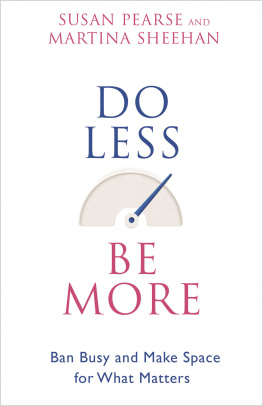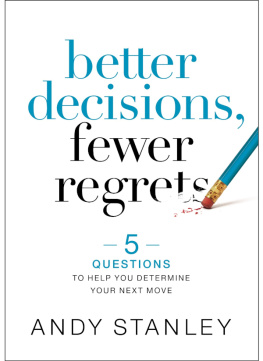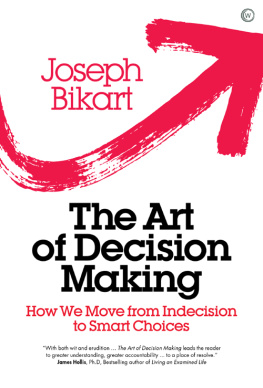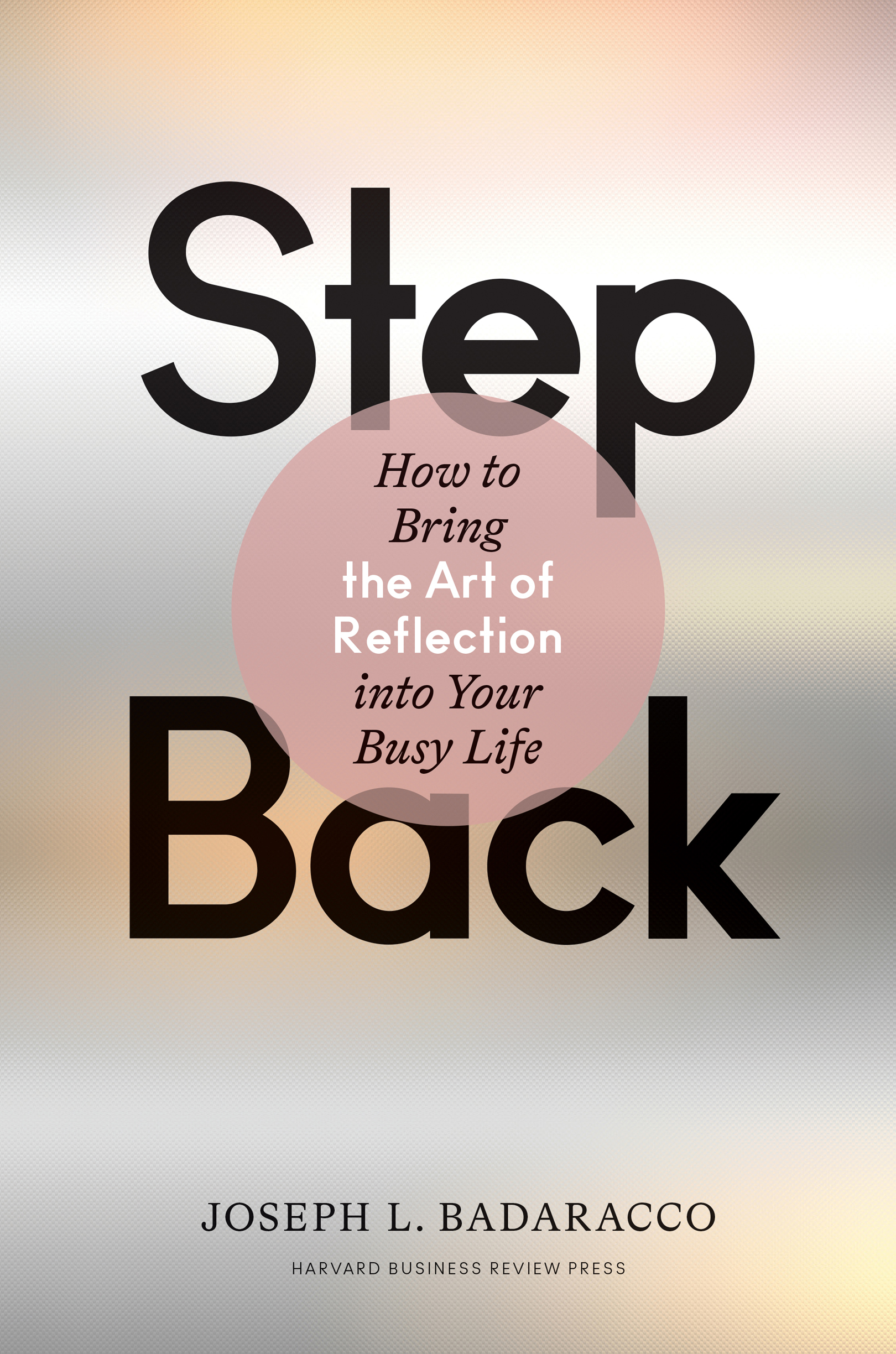JOSEPH L. BADARACCO
HBR Press Quantity Sales Discounts
Harvard Business Review Press titles are available at significant quantity discounts when purchased in bulk for client gifts, sales promotions, and premiums. Special editions, including books with corporate logos, customized covers, and letters from the company or CEO printed in the front matter, as well as excerpts of existing books, can also be created in large quantities for special needs.
For details and discount information for both print and ebook formats, contact .
Copyright 2020 Joseph L. Badaracco, Jr.
All rights reserved
No part of this publication may be reproduced, stored in or introduced into a retrieval system, or transmitted, in any form, or by any means (electronic, mechanical, photocopying, recording, or otherwise), without the prior permission of the publisher. Requests for permission should be directed to , or mailed to Permissions, Harvard Business School Publishing, 60 Harvard Way, Boston, Massachusetts 02163.
The web addresses referenced in this book were live and correct at the time of the books publication but may be subject to change.
Library of Congress Cataloging-in-Publication Data
Names: Badaracco, Joseph, author.
Title: Step back : how to bring the art of reflection into your busy life / Joseph L. Badaracco.
Description: Boston, MA : Harvard Business Review Press, [2020] | Includes index.
Identifiers: LCCN 2020004737 | ISBN 9781633698741 (hardcover) | ISBN 9781633698758 (ebook)
Subjects: LCSH: Critical thinking. | Well-being. | Success in business.
Classification: LCC BF441 .B254 2020 | DDC 153.4/2dc23
LC record available at https://lccn.loc.gov/2020004737
ISBN: 978-1-63369-874-1
eISBN: 978-1-63369-875-8
There are very few human beings who receive the truth, complete and staggering, by instant illumination. Most of them acquire it fragment by fragment, on a small scale, by successive developments, cellularly, like a laborious mosaic.
The Diary of Anas Nin, 19391944
CONTENTS
Mosaic Reflection
The founder and CEO of a very successful venture capital firm gives a particular piece of advice to entrepreneurs when his firm invests in their companies. He tells them, If I ever come into your office and find you looking out the window with your feet up on the desk, Im going to double your salary.
The CEO was sending two messages, and we all need to hear them. First, reflection is extremely important. In fact, it may be more important now than ever. As our world becomes more complex, fluid, time-pressured, and data-saturated, we need to think deeply about situations, problems, and decisionsat work and throughout the rest of life. The second lesson is that the world today makes it very hard to find time for reflection and might even be eroding our capacity to reflect.
What is reflection? The standard answer appears in familiar images. One is Rodins famous sculpture, The Thinker. Another is a Buddhist monk, sitting motionless in meditation. Another may be a solitary figure looking into a starry night sky or a woman with her head bowed in quiet prayer. Thousands of pages have been written about this solitary, deliberate, tranquil approach to reflection. But what is its relevance for people who work and live in a vortex of tasks, meetings, decisions, and serious responsibilities?
Four years ago, I set out to answer that question. I interviewed more than one hundred managers. They ranged from supervisors to CEOs and came from fifteen countries. Most worked in businesses, but the group also included a police chief, heads of several religious organizations, the coach of a major professional sports team, and university administrators. I also carefully studied classic works, like the Meditations of Marcus Aurelius and the Spiritual Exercises of Ignatius of Loyola, as well as a wide range of diaries and journals.
In the end, I concluded that busy, responsible men and women do make time to reflectbut not during extended periods of solitude. They rely instead on what I came to call mosaic reflection. A mosaic, of course, is artwork made from small pieces of stone or glass. It also describes what I learned in the interviews: busy, successful men and women do reflect, but they practice the art of reflection in the cracks and crevices of their everyday lives.
Why do they squeeze time for reflection into their already crowded lives? In one interview, a senior manager sketched the basic answer. For several weeks, he had been struggling with the question of whether to change career paths. At one point, he put his decision in a larger context:
Life is surfing a wave. It carries you forward. You spend most of your time adjusting and trying to stay on the wave and riding it. It may not be the right wave or the right wave anymore, and it may be headed for the rocks. Reflection is thinking about these questions.
This statement points to the basic two reasons why the managers I interviewed tried hard to find time for reflection.
One reason is practical. Reflection is a valuable tool for making better decisions, at work and in the rest of life. It is useful day by day, task by task, and problem by problem. As the senior executive put it, reflection can help you with adjusting and trying to stay on the wave. As another manager put it, I always have lingering doubts that Im not reflecting enough as I handle meeting after meeting.
The other basic reason to reflect is profound. Reflection is a way of grappling with the enduring human questions of how to live, what to really care about, and what counts as a good life. In other words, are you riding the right wave? This kind of reflection can make all the difference. In one interview, a former CEO said wistfully, I wish someone had asked me twenty-five, thirty years ago, Are you being true to yourself? Are you giving yourself enough time to reflect?
Reflection is stepping back to grasp what really mattersabout what you are experiencing, trying to understand, or doing. This is why reflection is remarkably valuable, in so many practical and profound ways. It is crucial to understand what really matterswhether you are running an entire company, leading a task force, navigating the health-care system for an elderly relative, juggling the daily tasks of most households, or struggling with any hard issue.
Throughout this book, you will read, in their own words, how men and women tried, sometimes failed, and often succeeded in finding ways to reflecton everyday problems, on their careers and families, and on the great, enduring questions of life. As you listen to these men and women, you can respond personally. You can ask yourself questions like these: Is this an obstacle to reflection I often face? Is this an approach to reflection I should try? Am I already doing something along these lines that I could do better?
By answering these questions for yourself, you can develop practical, everyday ways of reflecting that help you work better and live better. This is the aim Marcus Aurelius pursued in writing Meditations: to live in complete consciousness and lucidity; to give each of our instants full intensity; and to give meaning to our entire life.








